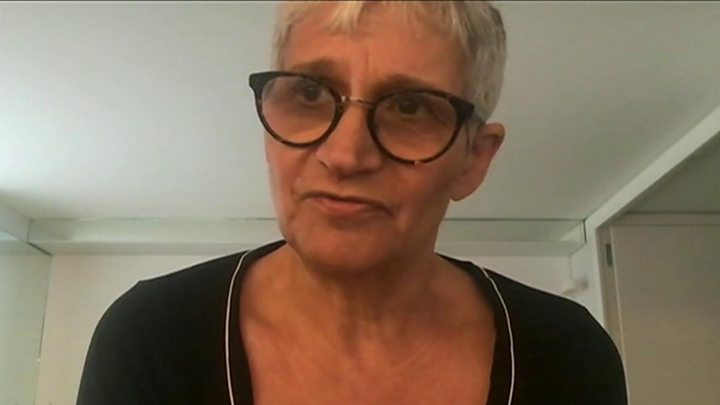Flanked by the country's chief scientific and medical advisers, the Prime Minister announced that his government was moving to the "delay" phase of its plan to tackle the outbreak, and warned Britons that they were facing their "worst public health crisis for a generation" and should be prepared "to lose loved ones before their time."
And yet, faced with such grave prospects, would the UK be taking the same stringent precautions as other affected countries? No, was the answer. At least not for now.
The British government has repeatedly said it does not believe that banning large-scale gatherings and closing schools -- like Italy, France, Germany and Spain have done -- would be effective in preventing the spread of the disease.
This comes despite the fact that parts of the British Isles, including the Republic of Ireland and Scotland (which is in the UK but has a separate healthcare system), are now emulating their continental neighbors.
However, with Johnson under pressure to do the same, the government said late on Friday it was planning to publish emergency legislation to ban large events.
"Ministers are working with the chief scientific adviser and chief medical officer on our plan to stop various types of public event, including mass gatherings, beginning next week," a Whitehall source told PA Media.
"We are also talking to businesses and other bodies about the timing of moving towards much more widespread working from home.
"We have drafted emergency legislation to give the government the powers it needs to deal with coronavirus, including powers to stop mass gatherings and compensate organizations."
The reason the UK has held off stricter "social distancing" measures appears to be rooted in the government's prediction that the outbreak may not peak until 14 weeks from now -- and that people will not be willing to drastically alter their ways of life and stick to the new rules for over three months, so there's little point imposing more restrictions just yet.
The latest recommendation for Britons is to self-isolate for seven days if they begin to experience a persistent cough or high temperature, and to continue with rigorous hygiene like frequently washing their hands and disinfecting surfaces.
Government ministers claim their decisions are being led purely by science. That science, they say, currently suggests that it would be beneficial for the country to build up some sort of herd immunity to the novel coronavirus strain in the long run. In short, authorities do want some Britons to get the bug, especially since for many, its symptoms will not be particularly debilitating.
The approach has divided opinion in the medical community. Some experts have accused Johnson of failing to grasp the severity of the situation, while others have praised the government for refusing to bow to continent-wide pressure to clamp down on the public's movements.
As of Friday, the number of confirmed cases in the UK stood at 798, with 10 deaths. However, the government's chief scientific adviser Patrick Vallance has admitted it was possible that 5,000 to 10,000 people may already be infected. And with testing capacity now about to be ramped up to 10,000 people a day, numbers will surely rise.
Medics warn of complacency
Government scientists said they have noticed that the virus typically results in a mild infection initially for patients with no underlying health conditions, which lasts about five days, but for the elderly or infirm, the pathogen enters a second phase thereafter, prompting an immune response that causes much of the damage that kills.
The experts' hope is that the UK's new plan will push the disease's peak past the traditional end of the flu season in April and into the summer, when the country's hospitals will be under less strain.
But many prominent members of the medical community are unconvinced by the government's approach. Doctors on the front line of intensive care units have warned about the potential lack of respirators, as seen in Italy and China when cases peaked there, and said that if staff become sick themselves, access to experienced labor could become a problem.
The editor-in-chief of the influential journal The Lancet criticized the UK's response to the crisis. "To avoid an unmanageable catastrophe in the UK, we need to be honest about what seems likely to happen in coming weeks. We need urgent surge capacity in intensive care. The NHS is not prepared,"
Richard Horton tweeted Thursday.
"I am not being alarmist. What is happening in Italy is real and taking place now. Our government is not preparing us for that reality. We need immediate and assertive social distancing and closure policies. We need to prepare the NHS. This is a serious plea."
For a country that until fairly recently routinely imposed quarantines on family pets, it's ironic that Johnson's "island mentality" -- made famous by his enthusiastic support for leaving the European Union -- seems not to stretch to public health, for ministers dismissed the suggestion Britain could shut its borders as
US President Donald Trump ordered this week.
'He's not doing a Trump'
Some scientists did offer words of support for the UK's measures.
"I am the first to admit that I'm not Boris Johnson's biggest fan. But I'm relatively impressed that unlike other political leaders, who've kind of bowed to the pressure of each other and their populations to implement school closures -- which we don't have enough evidence to know if it will make a difference or not -- Johnson is listening to the current evidence that's out there," Dr. Clare Wenham, assistant professor of global health policy at the London School of Economics, told CNN.
"He's not doing a Trump and shutting down borders, which we know will have no effect. He's taking a rather measured approach now -- but yes, it's a gamble."
Wenham added that she believed the government's priority was to avoid panic, and ensure the public's cooperation with prevention measures.
"It's a political gamble if they get it wrong. If all the countries that implemented school closures and mass travel and mass gatherings see reductions in rates, and the rates in the UK are soaring -- that's a gamble," she said.
"We know for example that shutting schools works for influenza because children are super-spreaders. We don't know if that's true for coronavirus yet. But I think the government is saying 'look, we don't yet know if kids are super-spreaders. So, why cause all the havoc of disrupting people's lives?'"
Keith Neal, emeritus professor in the epidemiology of infectious diseases at the University of Nottingham, also said he backed moves to contain the outbreak.
"The plans are sensible, it is very easy to say more needs to be done, but there is little evidence to make any decision," he told PA Media.
But former health secretary Jeremy Hunt told the BBC that many people "will be surprised and concerned" by the lack of action in controlling movements. "I think it is surprising and concerning that we're not doing any of it at all when we have just four weeks before we get to the stage that Italy is at.
"You would have thought that every single thing we do in that four weeks would be designed to slow the spread of people catching the virus."
'Spray, pay and pray'
Where the government has been more comfortable making decisive moves is on the economy.
New Chancellor Rishi Sunak this week put emergency funds on the table in his maiden budget -- not just to shore up the UK's National Health Service at a time of emergency, but also to shield small- to medium-sized businesses and the
"gig economy," replete with freelancers, from the effects of having staff off sick or working from home in isolation.
In a coordinated approach, the Bank of England also cut rates and announced stimulus.
The strategy was dubbed "Spray, pay and pray" by
the Financial Times' Lex column. And therein lies the clue: Downing Street seems to think the panic caused by the new strain of the virus -- or Covid-19 as it has become known -- could be more dangerous in the long run than the actual illness itself.
Whether the gamble of "keeping calm and carrying on" in the face of the coronavirus is the appropriate approach, only time will tell.
Tara John contributed to this report.
https://news.google.com/__i/rss/rd/articles/CBMiW2h0dHBzOi8vd3d3LmNubi5jb20vMjAyMC8wMy8xMy91ay91ay1jb3JvbmF2aXJ1cy1yZXNwb25zZS1ib3Jpcy1qb2huc29uLWludGwtZ2JyL2luZGV4Lmh0bWzSAV9odHRwczovL2FtcC5jbm4uY29tL2Nubi8yMDIwLzAzLzEzL3VrL3VrLWNvcm9uYXZpcnVzLXJlc3BvbnNlLWJvcmlzLWpvaG5zb24taW50bC1nYnIvaW5kZXguaHRtbA?oc=5





